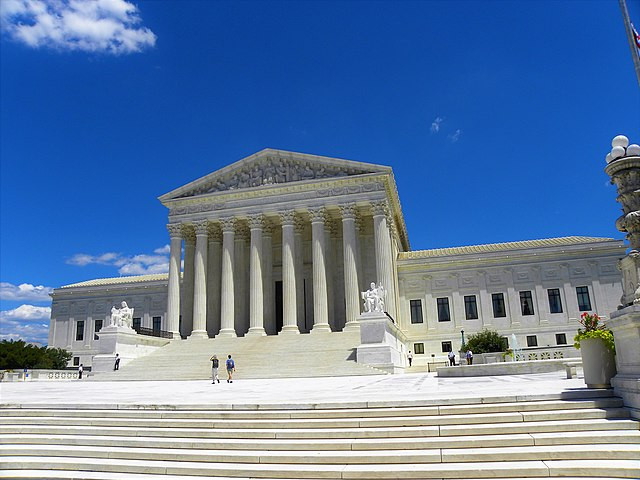The U.S. Supreme Court is wrestling with the case of Richard Glossip, an Oklahoma death row inmate whose conviction is under intense scrutiny due to allegations of withheld evidence and questionable witness credibility. During oral arguments on Wednesday, the justices appeared divided over whether to grant Glossip a new hearing, with some expressing skepticism about the conduct of prosecutors in his 1997 conviction.
Glossip, 61, was sentenced to death for allegedly orchestrating the murder of Barry Van Treese, the owner of an Oklahoma City motel. His conviction largely rested on the testimony of Justin Sneed, who carried out the killing. Sneed avoided the death penalty by implicating Glossip as the mastermind, but new revelations about Sneed's mental health have cast doubt on the reliability of his testimony. Justice Elena Kagan noted that Sneed had been "exposed as a liar" for falsely claiming he had never seen a psychiatrist, despite records showing he was treated for bipolar disorder with lithium.
The case has taken an unusual turn, with Oklahoma Attorney General Gentner Drummond siding with Glossip in calling for a review of the conviction. Drummond, a Republican, argued that the newly disclosed evidence about Sneed's psychiatric condition and the prosecutors' failure to disclose it warranted a reexamination of the case. "Glossip's conviction rests significantly on Sneed's credibility, and it should not be sustained," Drummond stated, signaling his support for further court proceedings.
During the hearing, the court's liberal justices, including Kagan and Justice Ketanji Brown Jackson, suggested that the case might benefit from a new evidentiary hearing to fully assess the impact of the suppressed evidence. "Why wouldn't we send it back for an evidentiary hearing?" Justice Jackson asked, highlighting the absence of a thorough court determination on the factual disputes raised by the new findings.
Justice Brett Kavanaugh, one of the court's conservative members, seemed open to the idea that the jury might have reached a different verdict had they been aware of Sneed's mental health issues. "I'm having some trouble with the idea that it still wouldn't have made a difference to the jury had they known that Sneed was bipolar and that he had lied on the stand," Kavanaugh said, signaling his concern over the potential miscarriage of justice.
Conversely, Justices Clarence Thomas and Samuel Alito appeared inclined to uphold Glossip's conviction. Thomas questioned why more detailed inquiries were not conducted into the actions of the original prosecutors, suggesting that their perspective is crucial to the case. He pointed out that the lack of direct testimony from these prosecutors leaves unanswered questions about their knowledge of Sneed's mental health condition. "It would seem that an interview of these two prosecutors would be central," Thomas remarked.
The debate among the justices reflects broader concerns about the integrity of the death penalty process, especially in cases where prosecutorial misconduct is alleged. This scrutiny comes on the heels of a recent Supreme Court decision allowing the execution of Marcellus Williams in Missouri, despite objections from prosecutors-a ruling that has intensified the spotlight on the court's handling of death penalty cases.
Oklahoma's highest criminal court had previously upheld Glossip's conviction, stating that the new evidence about Sneed's psychiatric treatment would not have altered the outcome. This decision stood in contrast to Attorney General Drummond's recommendation, which urged a new trial. The state court's stance has drawn criticism from several Supreme Court justices, who questioned the rigor of its review process.
Justice Amy Coney Barrett and Chief Justice John Roberts are expected to play pivotal roles in the final decision. With Justice Neil Gorsuch recused from the case due to his previous role on the 10th U.S. Circuit Court of Appeals, the court's ruling could potentially be split 4-4, which would leave the lower court's decision intact and deny Glossip a new hearing.
The stakes in this case are high, not only for Glossip, who has been on death row for over 25 years, but also for the broader criminal justice system. The Supreme Court's deliberation comes at a time when the death penalty in the U.S. is facing increasing legal and moral challenges. Eight states, including Texas and Utah, have urged the Supreme Court to uphold the Oklahoma court's ruling, arguing that federal intervention in state criminal cases undermines local judicial authority.
The spotlight on Glossip's case has drawn two of the nation's most experienced Supreme Court litigators. Seth Waxman, a former U.S. Solicitor General, argued on behalf of Glossip, emphasizing the need for transparency and fairness in capital punishment cases. Representing Oklahoma, Paul Clement, also a former Solicitor General, defended the state's position that the evidence at issue would not have swayed the jury's decision.






